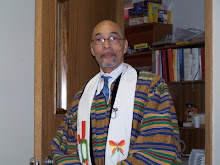Council rejects resolutions on same-sex marriages
Bishop Beverly Shamana presides over The United Methodist Church'sCalifornia-Nevada Annual (regional) Conference in Sacramento, Calif. A UMNS file photo by Paul "Spud" Hilton.
By Neill Caldwell*April 27, 2009 DENVER (UMNS)
United Methodist clergy cannot perform same-sex marriages, even in states where such unions are legal or the ceremonies are endorsed by a regional church group.
The Judicial Council, the denomination’s top court, ruled at its spring meeting that it is a chargeable offense for United Methodist clergy to perform ceremonies celebrating same-sex unions.
The ruling overturned resolutions from two annual conferences supporting clergy who perform same-gender marriages.
In the case of the California-Nevada Annual Conference, the council affirmed Bishop Beverly J. Shamana’s decision voiding a resolution passed by the regional group backing retired pastors who perform same-gender marriages.
“An annual conference may not legally negate, ignore or violate provisions of the (Book of) Discipline with which they disagree, even when the disagreements are based on conscientious objections to the provisions,” the council ruled.
Council member Belton Joyner Jr. filed a dissenting opinion.
In a separate decision, the council reversed California-Pacific Conference Bishop Mary Ann Swenson’s ruling supporting a conference resolution recognizing “the pastoral need and prophetic authority of our clergy and congregations to offer the ministry of marriage ceremonies for same-gender couples.”
In a concurring opinion, Jon Gray and the Rev. Kathy Austin Mahle wrote “church law can only be made by the General Conference and cannot be achieved through piecemeal resolutions adopted in an annual conference session.”
The 2008 General Conference, the denomination’s top legislative body, voted to retain its ban on same-gender marriages and to bar clergy from performing such marriages or consecrating them in the church. Pastors who perform same-gender unions risk losing their clergy credentials.
In other decisions, the council approved the lease of Southern Methodist University property for the George W. Bush presidential library, museum and public policy institute and did not take up a request from the Alaska Conference for a ruling on church law regarding the openness of church membership relative to pastoral discretion to deny membership.
The council said the lease agreement between United Methodist-related SMU and the George W. Bush Foundation does not violate church law.
Critics opposed to many policies of the Bush administration, including the war in Iraq, argued placing the institute on SMU property would be inconsistent with church teaching.
In its own review, the nine-member council said it found nothing in the lease agreement that violated the school’s Articles of Incorporation or the church’s Book of Discipline.
In the membership case, the council said it did not have jurisdiction to address possible competing claims in church rules because the request for a declaratory decision did not deal with an action by the Alaska Conference.
The case refers back to an earlier council ruling in favor of the right of a Virginia pastor, the Rev. Ed Johnson, to block a practicing homosexual from joining the congregation of South Hill (Va.) United Methodist Church. The council ruled the pastor of a local church has authority to determine a layperson’s readiness for membership.
The council also said it did not have jurisdiction to rule on a request from the West Ohio Annual Conference on the formula for deciding the number of bishops in a region. The 2008 General Conference approved a plan that will result in one less bishop in four of the five U.S. jurisdictions beginning in 2012.
*Caldwell is editor of the Virginia United Methodist Advocate and covers the Judicial Council for United Methodist News Service.
News media contact: David Briggs, Nashville, Tenn., (615) 742-5472 or
newsdesk@umcom.org.
